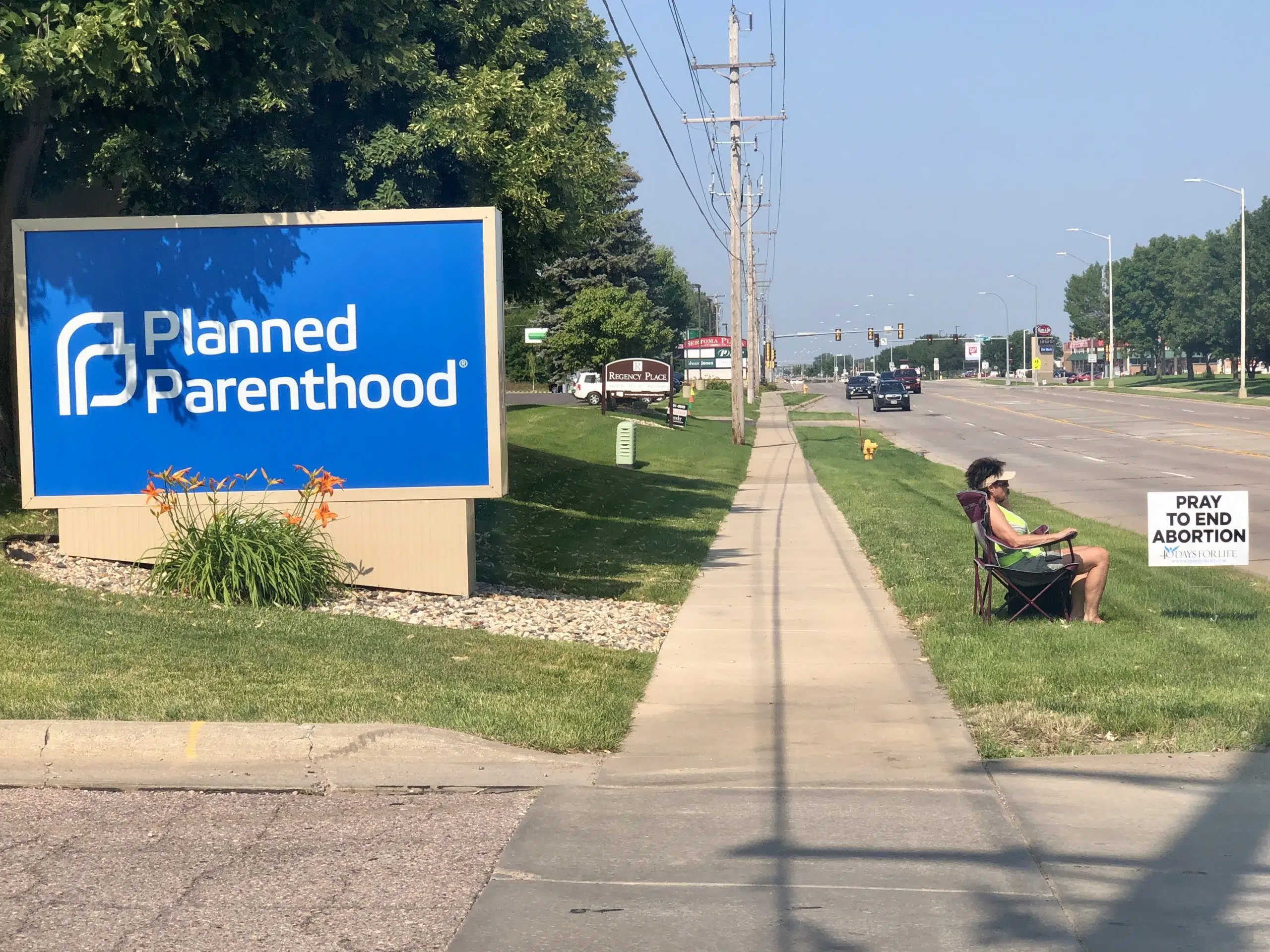
By Bart Pfankuch, South Dakota News Watch
Abortion is likely to be a major topic during the 2022 South Dakota legislative session that begins on Jan. 11, as opponents of the medical procedure see an opportunity to capitalize on recent legal cases across the country that further restricted access to abortion.
The anticipated legislation seeking to restrict abortion rights will come as the future of legal abortion in the U.S. is suddenly uncertain, and as a recent poll by South Dakota News Watch shows that three-quarters of registered voters in the state want abortion to remain legal, and that a solid majority of voters do not support increasing restrictions on the procedure.
For several years, Republican-dominated legislatures in South Dakota have considered and sometimes passed laws that make abortions harder to get, often by requiring more steps to be taken by pregnant women who want to terminate a pregnancy. Many of those laws were incremental in nature and were designed to restrict access to abortion without directly violating the 1973 Roe v. Wade U.S. Supreme Court decision that made abortion legal across the country.
But the anti-abortion movement in the U.S. saw renewed momentum on several fronts in 2021 that have set the stage for pro-life lawmakers in states like South Dakota to potentially push more aggressive legal steps to restrict access to abortion or even, as pro-choice advocates worry, make abortions essentially impossible to obtain.
As of Jan. 6, no bills related to abortion had been filed prior to the upcoming legislative session, according to the state Legislative Research Council. However, Gov. Kristi Noem has strongly signaled that she is likely to put forward measures to further restrict access to abortion, and a leading pro-life advocate in South Dakota told News Watch that anti-abortion legislation is almost certain to be considered in 2022.
“It’s a very exciting time to be part of the pro-life movement in America and especially right here in South Dakota,” said Dale Bartscher of Rapid City, executive director of South Dakota Right to Life.
Bartscher would not reveal specifics of bills he expects will be filed this session, but he said Right to Life is working with the governor’s office and pro-life lawmakers to take advantage of the apparent legal momentum against abortion rights in the U.S.
“It’s our goal to make abortion in the state of South Dakota both illegal and unthinkable,” Bartscher said.
Meanwhile, pro-choice advocates in South Dakota are aware that they may have to fight even harder than usual in 2022 to protect a woman’s right to choose whether to end a pregnancy.
“We know that we’re gearing up for a tough session in terms of reproductive health and reproductive rights,” said Kristin Hayward, manager of advocacy and development at Planned Parenthood in South Dakota. “We know that the overwhelmingly conservative legislators are in a space to make legislation on the rights of reproductive health.”
Bartscher said possible legislation in 2022 could be modeled after highly restrictive laws passed in 2021 in Texas and Mississippi, which some pro-choice advocates worry may essentially make abortions impossible to get.
In September 2021, the U.S. Supreme Court allowed a Texas law to stand that bans abortion after a doctor can detect a heartbeat in an unborn child, possibly as early as six weeks into pregnancy and before a woman may know she is pregnant. A new Texas law also enables a private citizen to sue abortion providers or anyone involved in helping a woman get an abortion, even someone who drives her to the procedure.
Last month, the U.S. Supreme Court heard oral arguments on a Mississippi law that bans abortions after 16 weeks, and has yet to rule on the matter. But some legal experts saw the court’s questioning as favorable to upholding the Mississippi law, and pro-choice advocates fear the conservative-led court could eventually overturn Roe v. Wade.
During the 2021 session, the South Dakota Legislature passed five measures restricting access to abortion, including one prohibiting a Down Syndrome diagnosis as justification for ending a pregnancy.
Noem recently used an executive order to limit women’s ability to get abortion medication through the mail.
In response to questions from News Watch, Noem spokesman Ian Fury did not provide specifics on whether the governor would propose legislation this session or what bills, if any, she may offer.
“Every life deserves protection, and I am committed to taking action to do so,” Noem said in an email to News Watch.
Abortions are performed only two or three days a month at one location in South Dakota — the Planned Parenthood clinic in Sioux Falls, which also provides a wide range of other reproductive-related services, according to Hayward.
Hayward said that outside the state Legislature, support is strong for keeping abortion legal in South Dakota and that a majority of the state does not want access to abortion further restricted. She noted that statewide referenda in 2006 and 2008 to ban abortions in most instances were both defeated by South Dakota voters.
As the legislative session approaches, Planned Parenthood is mobilizing members of the medical community who support a woman’s right to choose and will seek to bring forward the voices of those in the state who don’t want government to intrude in the lives and medical decisions of pregnant women.
“This goes down to the rights of people at their core, to be able to have privacy and to have rights to their own self,” she said. “The state of South Dakota needs to trust the women who reside in the state, trust them 100 percent to make decisions for themselves.”
The current national legal environment regarding abortion could lead to introduction and consideration of more aggressive legislation on abortion in South Dakota this session, according to Republican state Sen. Lee Schoenbeck, a Watertown attorney.
Schoenbeck, a pro-life lawmaker who is president pro tempore in the Senate, said changes in the legal landscape surrounding abortion in America may make some lawmakers likelier to vote for more sweeping or more restrictive abortion legislation this session than in the past.
South Dakota lawmakers who oppose abortion may back a bill that in the past seemed unconstitutional on its face or that was unlikely to withstand a court challenge.
“In the past, you’ll have legislators that wouldn’t vote for things that are not realistically going to matter,’” said Schoenbeck. “But this session, you’ll have legislators who may say, ‘Look, the court may let us do more.'”
During the annual legislative session, Right to Life representatives are in daily contact with the governor’s office and in periodic contact with Noem’s office throughout the year, Bartscher said. The group is also working with Mark Miller, the governor’s general counsel and interim chief of staff, who also serves as the Unborn Child Advocate in Noem’s office.
The Mason Dixon poll of 500 registered South Dakota voters was conducted in late October and sponsored by News Watch and the Chiesman Center for Democracy at the University of South Dakota. The error margin was +/- 4.5%.
Asked whether abortion in South Dakota should be legal, 18.4% of respondents said it should be legal in all circumstances, 19.0% said legal under most circumstances, 38.0% said legal in certain circumstances, 23.0% said not legal under any circumstances, and 1.6% were unsure.
On a subsequent question, whether South Dakota should increase restrictions on abortion, 24.8% of respondents said the state should increase restrictions, 40.2% said restrictions should be left the same, 21.0% wanted restrictions decreased, and 14.0% were unsure.
Even if restrictions to abortion are heightened in South Dakota, it is likely that women who want to terminate a pregnancy will still do so, according to a News Watch data analysis in 2021. Using data from health departments in South Dakota and neighboring states, News Watch showed that even when the Sioux Falls clinic closed completely during the early days of the COVID-19 pandemic, many South Dakota women traveled to other states to get the procedures.
State data show that abortions performed in South Dakota fell from about 400 in 2019 to 125 in 2020, a year in which the clinic ceased providing abortions for seven months. But that year, more than 450 South Dakota women traveled to a different state to obtain an abortion, far more than in a typical year, according to data from neighboring states.





Comments